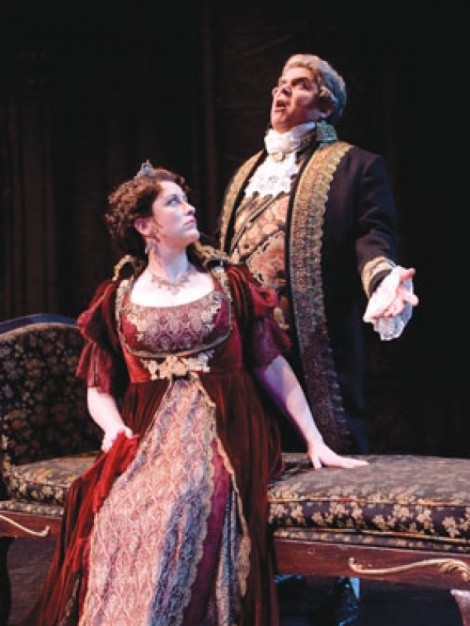
LeBron, who plays the villainous Scarpia in the upcoming Utah Opera production of Puccini’s Tosca, is joined by director Stephaine Sundine, conductor Joseph Rescigno, and Scott Piper and Cynthia Clayton, who play the lovers Cavaradossi and Tosca. The conversation is going back and forth like a harmonic volley discussing the virtues of opera in our contemporary age of Netflix and YouTube.
Tosca, the eighth most performed opera in the world, is a passionate story of lovers caught in an impossible situation, while engaged in a mortal fight against the evil that men do. Sundine says that Tosca has a vitality and simplicity that people respond to immediately, and that Puccini’s melodies grab you in the gut and heart and will pull you along into an experience that you will not get anywhere else. Such was the power the original play had on the composer Puccini himself. Even though critics thought the play was a lurid, cheap shocker, Puccini was determined to set the story to music. Tosca originally premiered in 1899 and has been a staple of the opera world since.
Clayton, the soprano who plays the title character, says that Tosca herself is a passionate woman who wears her emotions on her sleeve. She will be jealous at one moment but quickly turn to a variety of emotions on short notice. Clayton says that Tosca is so different from herself that it is sometimes hard to relate to her, but it’s something that she has fun exploring.
Tosca’s lover Cavaradossi, meanwhile, is described by Clayton as the “best boyfriend” you will find in opera. He puts up with a lot, looking past jealousies and holds to his ideals in the face of tremendous danger. He is a romantic light in this dark story. According to Sundine, the audiences roots for Cavaradossi and Tosca’s love to win.
LeBron describes his character Scarpia as the most sadistic creation in the world of opera. LeBron enjoys playing the villain, which allows him to explore a side of reality that is far removed from everyday life. He is interested in how Scarpia, a man of God who believes he is doing right, becomes a relentless villain and uses prison and torture to accomplish order and peace. With such forces inhabiting this story, Tosca’s relevance to our contemporary world is brimming with possibilities.
Still wrestling with the earlier question, someone in the group asked what people experience at the opera that they won’t find elsewhere. LeBron spoke about his first time attending a live basketball game. He was surprised by the sound of the sneakers on the floor along with all the sights and sounds you don’t get by watching basketball on television. It is those unexpected moments, Clayton added, that make opera unique. It has a lack of safety; things will happen by accident in the best possible way. They both agree the experience you have cannot be had anywhere else.
Speaking of the music, conductor Rescigno says it is a departure from Puccini’s previous operas, filled with sharp and angular tempos and motifs. This is because Tosca is considered an “opera of action,” with little time to relax. Rescigno assures us that the beauty and colors of the music are of a quality that you can’t get in television or film. And Piper tells us that music is like chocolate—your body will respond to the beauty found in this music, just like it might to a rich, dark chocolate. In talking with this passionate group, the desire to go to the opera becomes contagious.
The combination of action and music, violence and beauty, recalls what a London newspaper said about Tosca when it originally premiered in 1899: that the juxtaposition of art and brutality creates a “feeling of nausea.” Tosca may have been ahead of its time, and more than 100 years later, it finds a welcome place among our post-modern entertainment.
But what about those “two guys” across the street? LeBron says that they would see what human beings can do that no other species can do; they will get in a few hours what Western civilization has accomplished up to now. He states unequivocally, “With even all the bad in the world, we come together for a few hours to celebrate the maximum achievement of human possibility.”
TOSCA Utah Opera, Capitol Theatre, 50 W. 200 South, 533-NOTE. Jan. 19–27, UtahSymphonyOpera.org